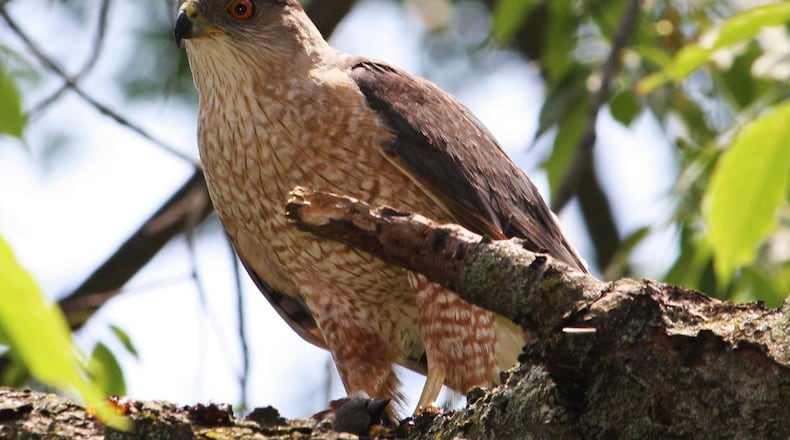My friend Dorrie has always enjoyed bird watching. But in 2020, it became a real hobby.
She upgraded her camera, got a long-range lens and added bird feeders to her backyard.
She sits in a chair with her camera ready, surveilling birds as they come to eat at a feeder, play in the bird bath or rest on the fence. Sometimes, she ventures to a park or lake to photograph birds. But mostly, she lets them come to her.
“I am a Black woman from the South. I was raised with cautionary tales about being safe and paying attention to your surroundings. One reason I am a backyard birder is because exploring nature by myself may not be the safest thing to do,” she said.
As if to confirm those cautionary tales, not long after Dorrie began birding in earnest, a fellow Black birdwatcher named Christian Cooper rose to fame. He was in New York’s Central Park when he asked a white woman to leash her dog as park rules required. She falsely reported that he was threatening her.
Black birders across the country were outraged, but not surprised.
That moment fueled a movement that has led to a reckoning of sorts in birding and naturalist communities. Last month, that reckoning came to Atlanta.
Until the Civil Rights Act was passed in 1964, many states legally barred Black people from state and national parks or forced them to go to segregated areas. Research shows that had a residual effect. People of color are far less likely to participate in nature-based, outdoor recreation activities, like birding.
It doesn’t help that it’s well documented that John James Audubon, the naturalist and ornithologist for whom America’s best-known bird conservation group is named, held racist views toward Black and Native people.
On Nov. 30, the Georgia Audubon society announced the organization would be changing its name to Birds Georgia.
“We learned that there are fellow bird conservationists and prospective bird lovers who feel unwelcome when we use the Audubon name,” said board vice-chair Marc Goncher in a statement. “As our state continues to diversify and new generations join the birding community, we foresee a declining awareness of the Audubon brand and reduction in positive association with what it was intended to represent.”
Elsewhere, some other independent chapters of the National Audubon Society also have removed Audubon’s name. The national organization opted to keep the name but committed $25 million to fund diversity-related initiatives over the next five years.
Just a few weeks before the Georgia birding group made its announcement, the American Ornithological Society decided after months of debate to change all bird names derived from people — more than 100 species across the Americas. Some of the historical figures had questionable pasts. Some didn’t. The society decided to make it a clean sweep.
Credit: Dorrie Toney
Credit: Dorrie Toney
Goodbye Audubon’s Oriole. So long Bachman’s Warbler, the rare songbird named after a naturalist who used scripture to support enslavement.
Some people are troubled by these changes. They see it as an unwarranted erasure of history.
You can’t erase the history of Audubon or anyone else by removing their names from organizations or birds. The history is always there for discovery, with all its warts and contradictions.
But naming an institution or a bird after an individual is meant to honor that person, and that person should be worthy.
The fact that some people are clinging so tightly to old names is itself a testament to the power of names and the power of the people doing the naming.
“One of the challenges in science more broadly is that, a lot of what we do and the way we think about biodiversity, not just with birds but with all living things, is with this possession mindset,” said Corina Newsome, a conservationist who once worked as community engagement manager for Georgia Birds.
Ten years ago, Newsome, who is Black, didn’t know who Audubon was, let alone about his racist past. She didn’t see his name as a barrier to her engagement with birds and nature, but she did see the problematic way birding groups related to particular communities. She said they aren’t working hard enough to be inclusive.
Some of the reasons that more Black people don’t engage in birding are economic, such as the cost of binoculars or cameras. Other reasons are social, such as perceptions of discrimination in spaces such as parks, specifically in Cooper’s case, a park right in the middle of one of the most diverse cities in the nation.
Newsome said she’s proud of the birding community in Georgia, for making a change that requires some risk in terms of cost, branding and legacy. But she wants to see more efforts to build relationships and trust with people who have long been on the outside of the naturalist community.
Acknowledging a racist past is important. But taking real action to become more welcoming is more important.
For some people, changing the name of birds and organizations may seem superficial. But for others, it is a clear indication of a willingness to self-examine and take a new path, even if that means parting with some traditions.
Changing names is just a start, but it’s a good one.
Read more on the Real Life blog (www.ajc.com/opinion/real-life-blog/) and find Nedra on Facebook (www.facebook.com/AJCRealLifeColumn) and Twitter (@nrhoneajc) or email her at nedra.rhone@ajc.com.
About the Author
Keep Reading
The Latest
Featured



